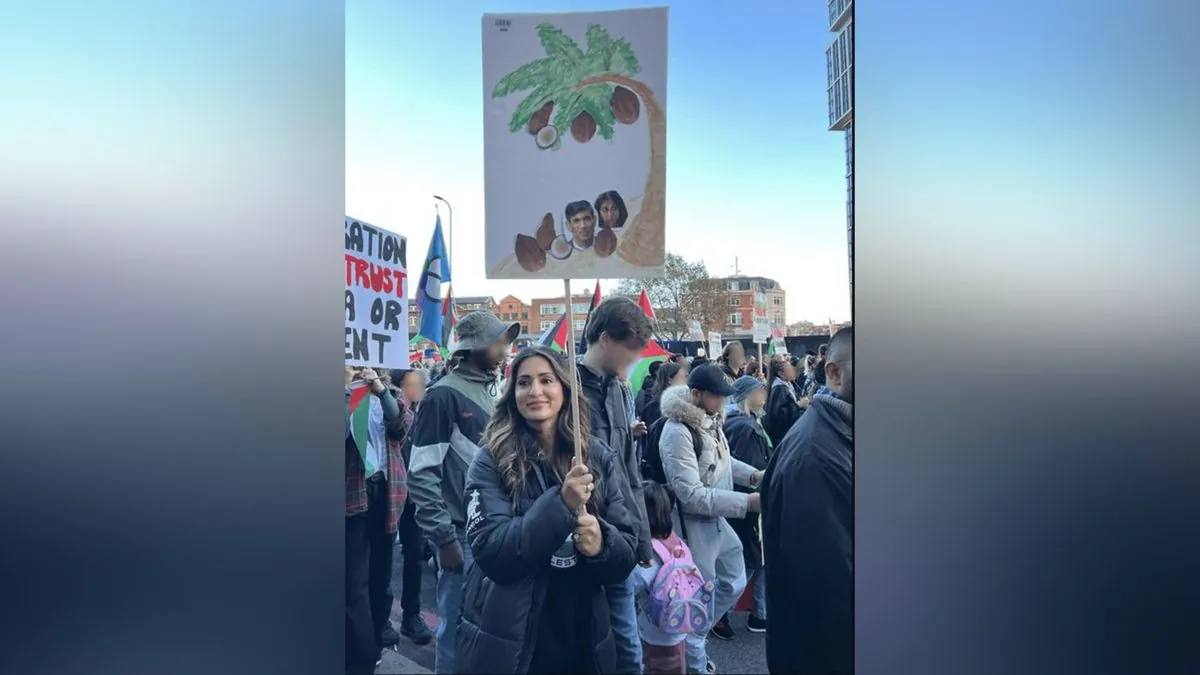Teacher Acquitted in Controversial 'Coconut' Placard Case
A UK teacher was found not guilty of racial offense for a placard depicting politicians as coconuts. The case sparked debate on free speech and political satire limits.

In a case that has ignited debate over the boundaries of political satire and free speech, Marieha Hussain, a 37-year-old teacher, was acquitted of a racially aggravated public order offense on September 13, 2024. The verdict, delivered at Westminster Magistrates' Court, stemmed from an incident at a pro-Palestine protest held 10 months earlier.
Hussain's controversial placard depicted Rishi Sunak and Suella Braverman alongside coconuts, a representation that prosecutors argued was racially abusive. However, District Judge Vanessa Lloyd ruled that the display fell within the realm of political satire, stating that the prosecution failed to prove it was abusive beyond reasonable doubt.
The case has highlighted the complex intersection of free speech, political commentary, and racial sensitivity in the UK. Political satire has a rich history in British culture, dating back to the 18th century, and remains a protected form of expression under Article 10 of the European Convention on Human Rights.

Hussain's defense team, led by Rajiv Menon KC, argued that the placard was a "light-hearted piece of political banter" aimed at criticizing the policies of Sunak and Braverman, particularly regarding immigration and the controversial Rwanda asylum plan. They emphasized that Hussain, described as a person of "impeccable character," should not be criminalized for satirical expression.
The prosecution, represented by Jonathan Bryan, contended that the term "coconut" is a racial slur, implying someone is "brown on the outside, but white on the inside." This argument touches on the complex issue of perceived racial or cultural betrayal, a concept that has manifested in various forms throughout history.
The case has raised questions about the application of hate speech laws and their potential impact on minority communities. The UK's Public Order Act 1986, which deals with racially aggravated offenses, aims to protect individuals from harassment and abuse. However, critics argue that such laws must be carefully balanced against the right to free expression.
"The damage done to my reputation and image can never be undone. The laws on hate speech must serve to protect us more but this trial shows that these rules are being weaponised to target ethnic minorities."
Hussain's acquittal was met with cheers from supporters, but the case has left a lasting impact on her life. She reported losing her career and facing media vilification during her pregnancy as a result of the charges.
This case serves as a reminder of the ongoing challenges in navigating the fine line between protected speech and harmful expression in a diverse society. It also underscores the importance of context in interpreting potentially offensive symbols or language in political discourse.
As the UK continues to grapple with issues of race, immigration, and free speech, cases like Hussain's will likely continue to spark important conversations about the role of satire, the limits of protest, and the protection of minority voices in the public sphere.


































